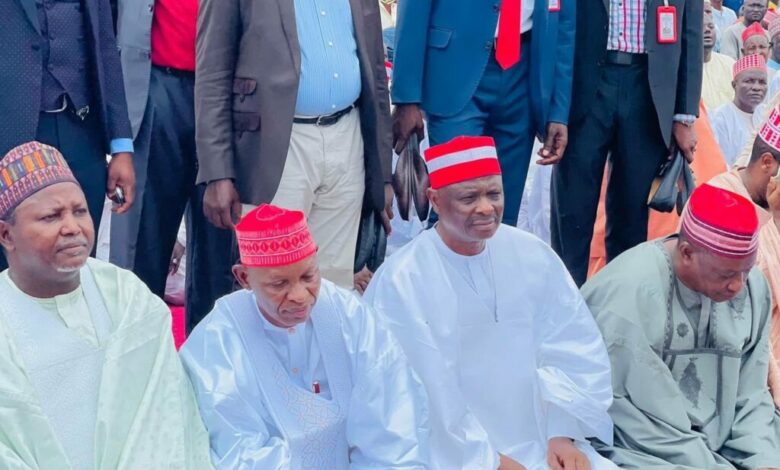Opinion
Weaponizing benefits: NNPP’s bid to counter APC’s growing influence in Kano

In a state as politically dynamic as Kano, the landscape is constantly shifting, shaped by each decision and appointment in Abuja. Recently, a significant reshaping occurred when President Bola Ahmed Tinubu appointed Rt. Hon. Yusuf Abdullahi Ata as a Minister of State for Housing and Urban Development. With this appointment, President Tinubu demonstrated a political masterstroke by strategically aligning appointments to balance representation across the three senatorial zones of Kano State.
This move has sparked a fresh wave of support for the All Progressives Congress (APC) in Kano, challenging the previously secure power base of the New Nigeria People’s Party (NNPP) government in the state. However, the NNPP government’s response reveals a concerning lack of adaptability and a reliance on outdated tactics to retain influence.
The appointment of Rt. Hon. Ata has not only bolstered the APC but has ignited renewed interest in the party’s potential to realign Kano’s political future. Ata, a highly respected figure, has swiftly gained popularity, symbolizing a renewed momentum for the APC in Kano.
The ruling NNPP government appears unable to comprehend the gravity of this shift, and its recent actions highlight a desperation to maintain relevance. In a bid to reclaim public favor, the government recently announced its intent to settle long-overdue gratuities and severance benefits for former Local Government Chairmen and Councilors, many of whom have awaited these payments since the first set of elected officials left office in 2001.
READ ALSO :Kano NNPP lawmaker dumps Kwankwaso’s faction, pledges loyalty to gov
While on the surface, this appears to be a long-overdue attempt to address outstanding debts, in reality, it is an attempt to distract from the growing appeal of the APC and its fresh momentum.
For over two decades, many elected Local Government officials have been denied their rightful gratuities. If the NNPP government truly intended to settle these long-standing obligations, the process is straightforward.
The records needed to determine who is owed are already readily accessible. Both the Ministry of Finance and the Ministry of Local Government and Chieftaincy Affairs have the necessary documentation to confirm the payment status of each official, as do the Local Government councils where these officials served. A genuine government response would involve retrieving and reviewing these records, then making the overdue payments without unnecessary delay.
Instead, the government chose a more elaborate and overtly political approach, organizing a public gathering at the Coronation Hall of Government House on November 12, 2024. During this meeting, former Local Government officials were directed to visit their respective councils for screening and verification—steps that, in practice, only serve to delay and complicate an otherwise straightforward process.
To compound matters, the officials were subtly encouraged to join the Kwankwassiya movement as part of the process, turning what should be an impartial administrative task into an overt political recruitment drive. The implication is clear: the government is seeking to score political points by leveraging the financial rights of former public servants as bargaining tools.
This strategy is a flimsy response to the real threat the NNPP faces as the APC continues to gain traction. Rather than addressing the issue directly and paying these officials their dues, the NNPP government has resorted to tactics that underscore its diminishing credibility.
The recent appointment of Rt. Hon. Ata has served as a rallying point for the APC, creating a fresh momentum that is difficult to dismiss. Ata’s popularity, bolstered by his new ministerial position, has rejuvenated the APC in Kano, creating a robust foundation for the party as it heads into upcoming campaigns.
The NNPP’s response reveals not only a failure to counter this momentum meaningfully but also a misjudgment of public sentiment. The people of Kano recognize political maneuvering when they see it, and the NNPP’s attempts to court public favor with hollow gestures are unlikely to sway a population eager for substantive leadership.
As President Tinubu’s administration redefines political appointments and strengthens national unity, the Kano NNPP government should take note: superficial tactics will not resonate with a populace witnessing genuine political progress. For the APC, this new energy has positioned the party as a formidable contender, and it is poised to sweep upcoming polls if it maintains this momentum. This shift is not simply about one appointment but reflects a broader alignment with the aspirations of Kano’s people, who seek responsive, effective governance.
In conclusion, if the NNPP government is genuinely committed to addressing past grievances, it should demonstrate this by retrieving existing records and promptly settling these long-overdue payments, rather than employing elaborate and politicized processes.
As it stands, this hollow display only serves to underscore the party’s insecurity in the face of a resurgent APC. The political landscape in Kano is changing, and with this newfound momentum, the APC is well-positioned to capture the support of a population eager for genuine progress and representation. The NNPP would do well to acknowledge this reality, for only with meaningful actions—not political theatrics—can it hope to regain the trust of Kano’s electorate.


























